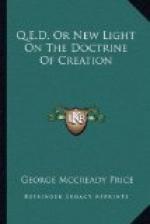Nor is there any other method known to modern science by means of which new factors can be originated which were not potentially latent in the ancestry. The much heralded new “species” of de Vries and others are now known to be merely new factors cropping out;[31] for though they remain constant and breed true, they obey Mendel’s Law when crossed with their parental forms, and hence are merely the result of some new combination of factors which can be reproduced at will by using the same method of combination and segregation. The real scientific test for any form supposed to be a new “species” would be twofold: (1) to show that some new character had been added which no ancestor ever possessed; and (2) to show that this new character will breed true under all circumstances of hybridization and not merely segregate as a unit character or mere analytic variety after hybridization. It is almost superfluous to say that no “new species” originating in modern times has ever justified itself under these tests.
[Footnote 31: Some of our leading biologists are now disposed to grow somewhat humorous when speaking of this mutation theory of de Vries, as may be illustrated by the following:
“The mutation theory of de Vries appears accordingly to lag useless on the biological stage, and may apparently be now relegated to the limbo of discarded hypotheses.... The present refutation has been undertaken in the interest of biological progress in this country. It is now high time, so far as the so-called mutation hypothesis, based on the conduct of the evening primrose in cultures, is concerned, that the younger generation of biologists should take heed lest the primrose path of dalliance lead them imperceptibly into the primrose path to the everlasting bonfire.”—Prof. Edw. C. Jeffrey (Harvard), in Science, April 3, 1914.]
In conclusion it may be remarked that biologists do not claim to have solved all the problems connected with heredity and variation. But the general results taught us by Mendelism are now established beyond controversy. Led by the German biologists, the leading scientists of the world had already acknowledged that “pure” Darwinism or natural selection cannot explain the origin of new organs or new forms. And now Mendelism destroys the other supposed foundation for biological evolution, by showing that small variations cannot be accumulated into large differences equal in value to a unit character or a new species. Thus the whole foundation of biological evolution has been completely undermined by these new discoveries; and were it not for the wide-spread credence the evolutionary theory has already received, and the intellectual momentum it has acquired tending to carry it on by its inertia into the future, it could be only a very short time now before the elaborate treatises attempting to orientate with it all the facts of religion and history would have to be consigned to the shelves labeled, “Of Historic Interest.” For as Bateson remarked in his recent address as President before the British Association at Melbourne, Australia, the new knowledge of heredity shows that whatever evolution there is occurs by loss of factors and not by gain, and that in this way the progress of science is “destroying much that till lately passed for gospel."[32]




